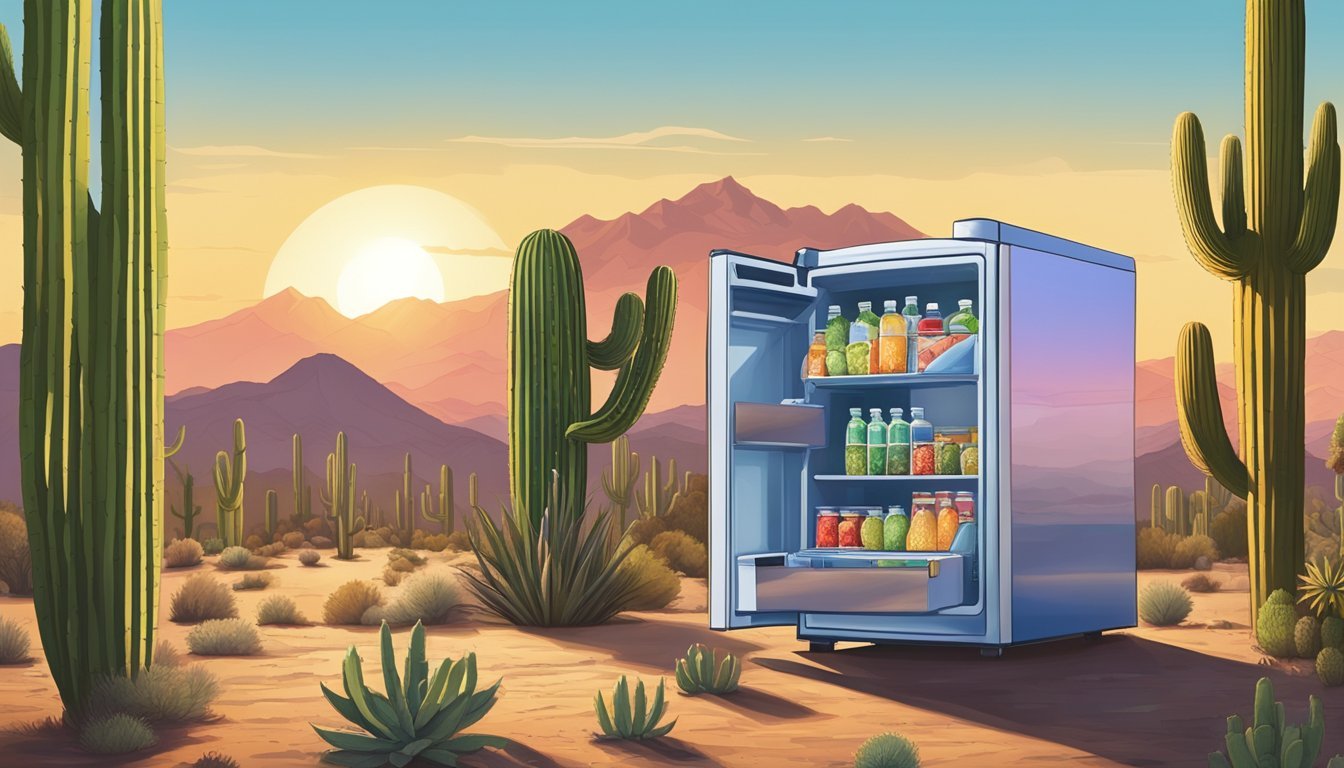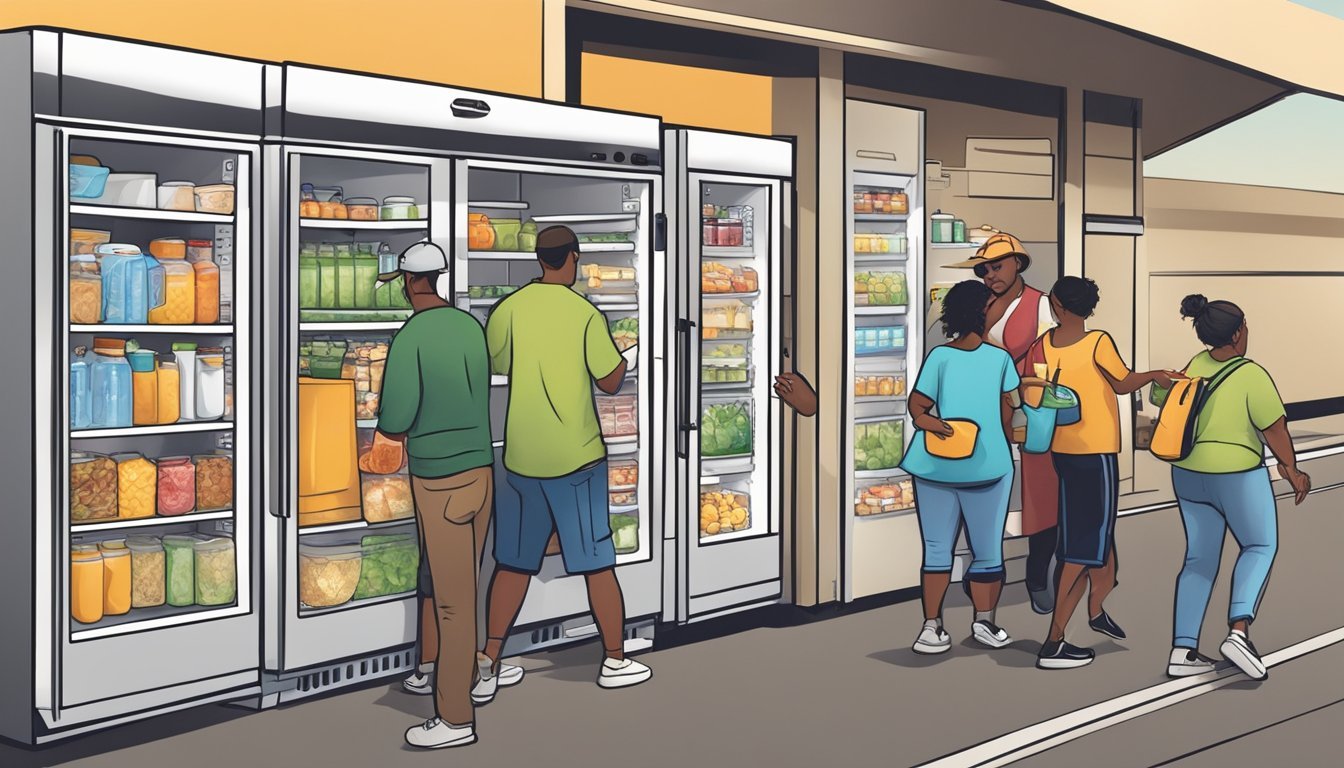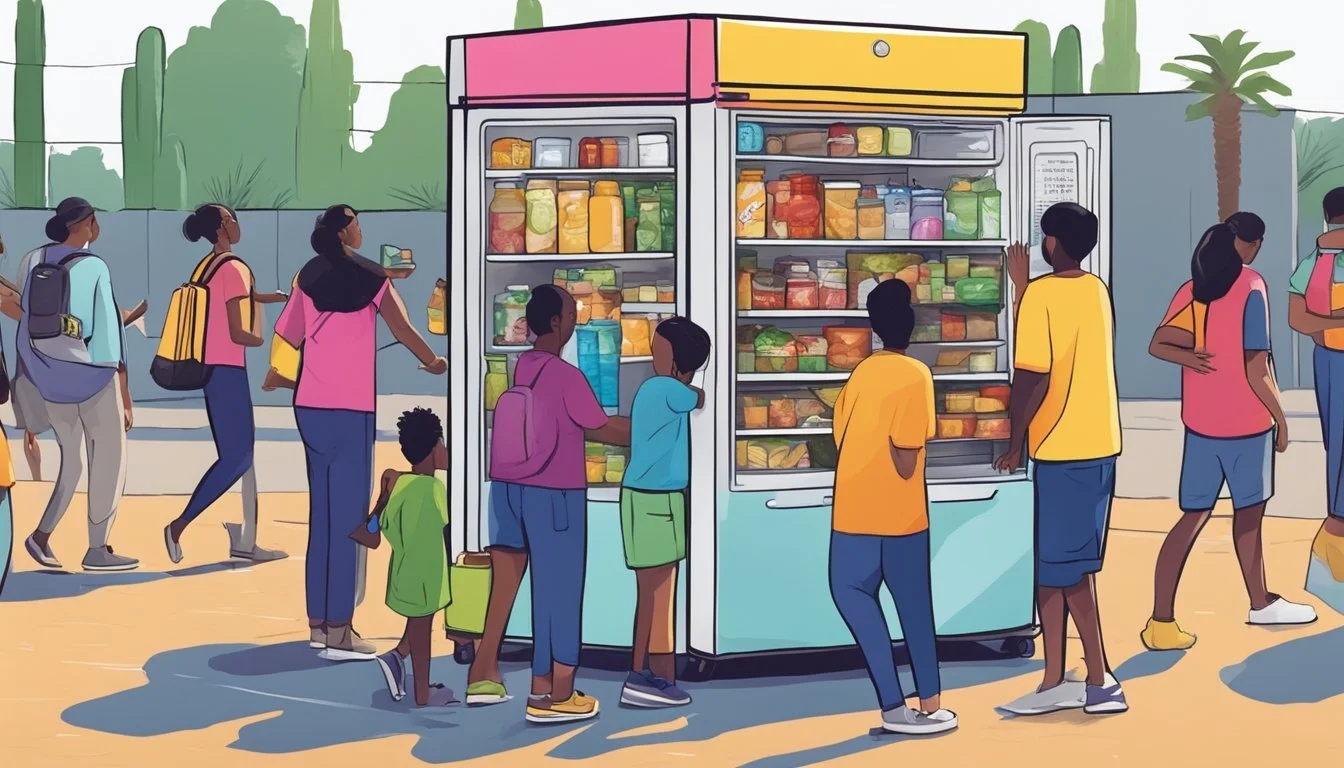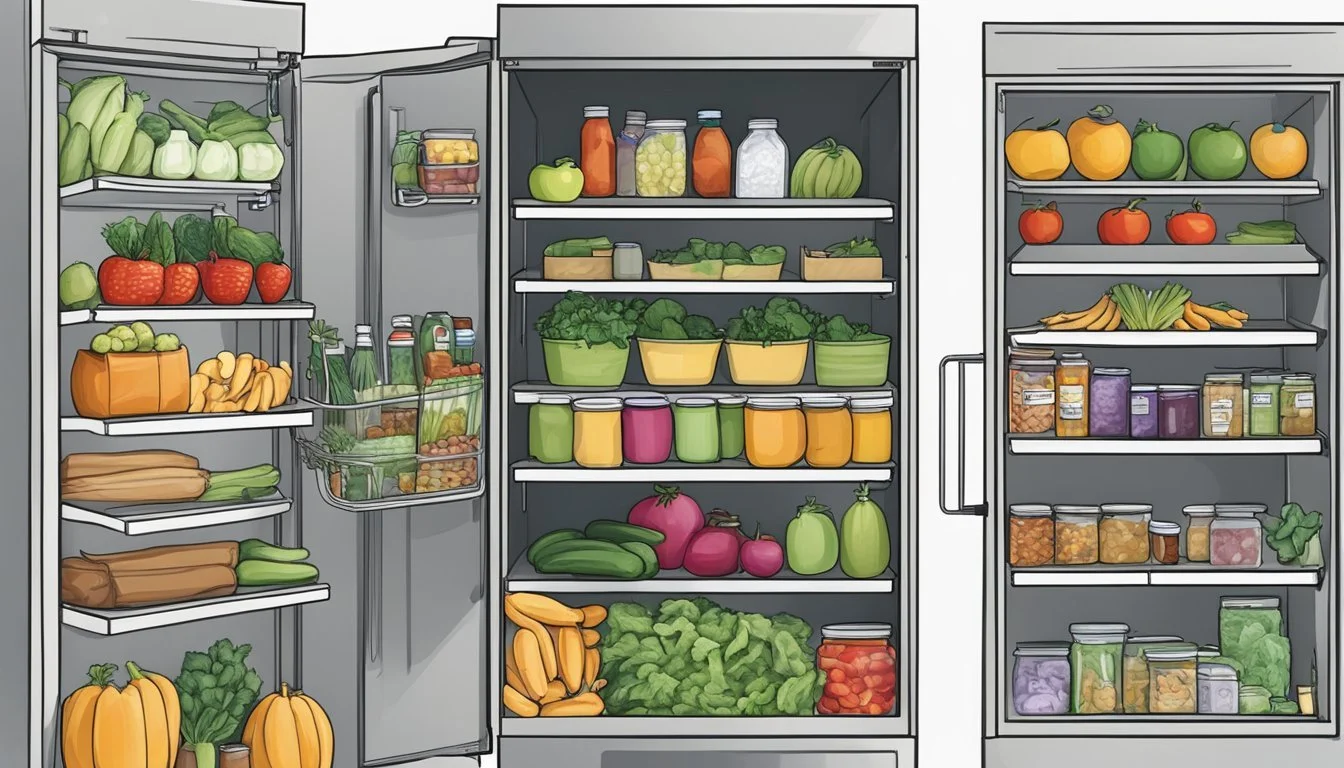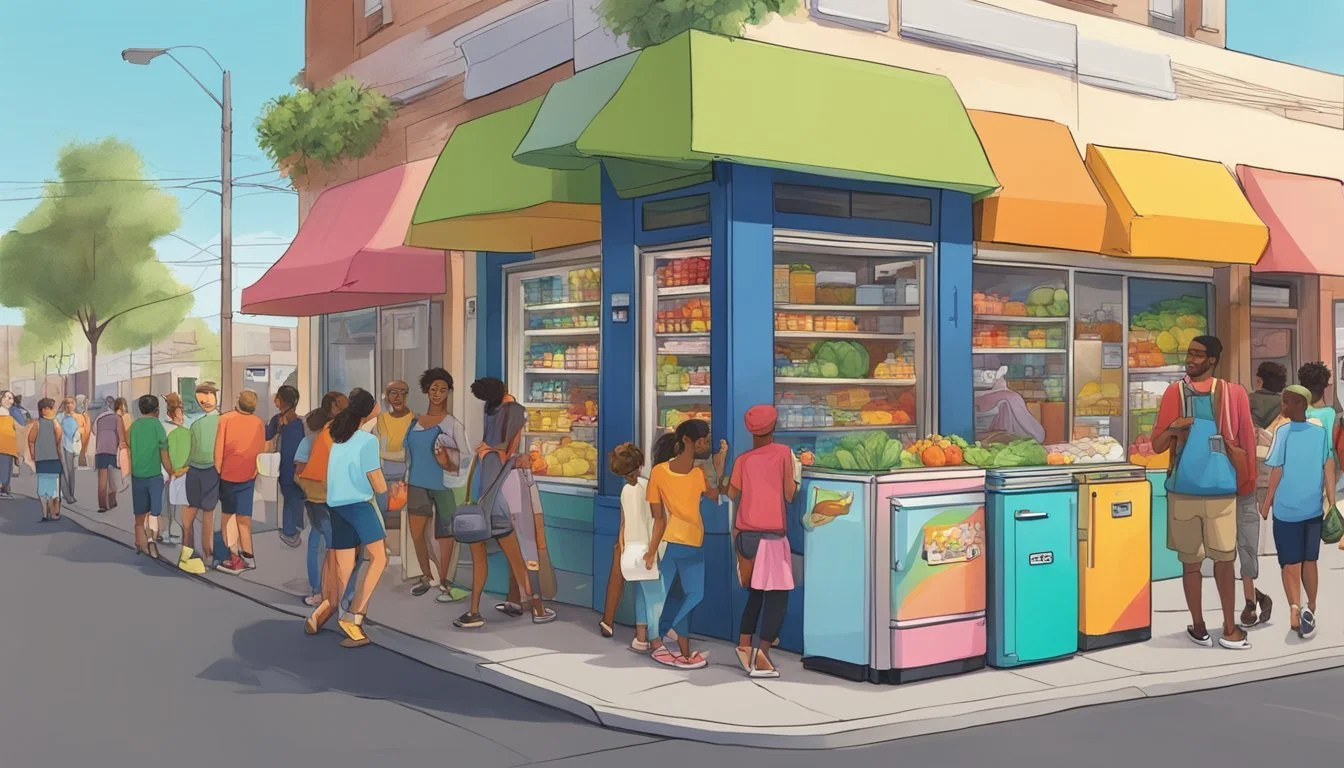Phoenix, AZ Community Fridge
A Fresh Approach to Combatting Food Insecurity
Community refrigerators have emerged as a beacon of mutual aid and support across the nation, and Phoenix, Arizona is not an exception. Often vibrantly decorated and inviting, these community fridges operate on the principle of taking what you need and leaving what you can. Positioned in accessible public areas, they aim to alleviate food insecurity by making perishable food items freely available to everyone in the community, no questions asked.
In Phoenix, local initiatives have seen a growth in the number of community fridges set up to provide sustenance for those in need. These refrigerators are stocked with food surplus, primarily through donations from local residents, businesses, and sometimes even farms looking to reduce waste by sharing their excess produce. By doing so, these fridges not only feed people but also present an effective grassroots solution to combating food waste.
The honor system is the cornerstone of the community fridge operation, fostering an environment of trust and community spirit. As these fridges become more integrated into the fabric of Phoenix, they not only offer a lifeline to the hungry but also a point of connection between diverse groups, encouraging residents to support each other in these shared urban spaces.
Phoenix Community Fridge Overview
Phoenix Community Fridges offer a progressive solution to food insecurity and waste by providing free accessible food to locals. Embedded within Arizona's community landscapes, these refrigerators serve as landmarks of goodwill and sustainability.
Concept and History
The Community Fridge movement in Phoenix represents a grassroots response to combat food insecurity and waste. Local businesses and individuals donate surplus food, which is then made available to anyone who needs it. Initiated by a recognition of need within the metropolis, Phoenix has welcomed these communal fridges with open arms, seeing growth in both number and social impact since their inception.
Mission and Vision
The mission behind Phoenix's Community Fridges is to foster a sharing economy where food is redistributed freely on an honor system, rather than going to waste. The vision embraces a future where communities are interconnected, and no individual faces the hurdle of hunger unnecessarily. By sharing resources, these fridges exemplify a sustainable model for mutual aid and community engagement.
Location and Accessibility
Community Fridges are strategically positioned across metro Phoenix, including downtown Phoenix, ensuring they are accessible to a wide demographic. Notably, one located at 1332 E Taylor St, Phoenix, 85006, highlights a 24/7 open policy, emphasizing the fact that free food is available around the clock to those in need:
Downtown Phoenix: Open access points for easy reach by city dwellers.
Metro Phoenix Area: Wider distribution to address suburban needs.
Operational Hours: Mostly available 24/7 to accommodate diverse schedules.
Operating the Community Fridge
Operating a community fridge in Phoenix, AZ, involves ensuring health and safety compliance, maintaining a balance between supply and demand, and fostering community involvement. These components are crucial for the safe and effective operation of the fridge.
Health and Safety Compliance
Community fridges must adhere to health and safety protocols to ensure that all food items, especially perishables like produce, meat, and dairy products such as eggs, are stored properly. The fridge needs to be consistently maintained at safe temperatures, with the freezer below 0°F and the refrigerator below 40°F. Regular cleaning schedules and frequent checks are imperative to meet local health laws. Here is a simplified 5-step guide for health and safety compliance:
Check Temperatures: Ensure the fridge and freezer are at the correct temperatures.
Clean Regularly: Schedule daily and deep cleaning to maintain hygiene.
Inspect Food: Examine donations for spoilage and expiration dates before placing them in the fridge.
Label Clearly: Date and label all items, especially opened packages.
Educate Volunteers: Train all handlers on proper food safety practices.
Maintaining Supply and Demand
The success of a community fridge hinges on its ability to balance the supply of essential items, such as bread and toiletries, with community demand. This balance ensures a steady flow of resources without excessive waste. Outreach to local businesses, farms, and individuals can help stock the fridge with surplus produce and other staples. Using an inventory system aids in tracking which items are needed most and prevents the overstocking of certain foods.
Monitor Inventory: Keep track of what items go quickly and which linger.
Partner with Providers: Collaborate with local retailers and producers for diverse contributions.
Track Trends: Recognize patterns in demand to anticipate community needs.
Community Involvement
Active community participation is vital for the project's sustainability. Volunteers play a key role in the fridge's operation, from stocking shelves to organizing food drives. Outreach initiatives help to raise awareness of the fridge and encourage locals to donate what they can and take what they need. Community involvement also includes education about reducing food waste and sharing resources within the neighborhood.
Recruit Volunteers: Engage community members to assist in daily operations.
Promote Awareness: Use social media and local events to spread the word.
Educate the Public: Inform about the impact and importance of the fridge to the community.
Impact and Benefits
Community refrigerators in Phoenix, AZ, offer a practical solution to critical societal issues. They serve not only as a hub for accessing food but also contribute to waste reduction and community engagement.
Fighting Food Insecurity
Phoenix's community refrigerators provide essential resources for people facing food insecurity. By offering nutritious food at no cost, these solidarity fridges act as a safety net during tough economic times, including the repercussions of the pandemic. These community-driven efforts ensure that individuals and families have access to food staples, making a measurable difference in the lives of thousands.
Key Figures:
Over 7,000 people experiencing homelessness
51% of those are unsheltered and with limited food access
Environmental Considerations
These refrigerators tackle environmental issues by reducing waste. The redistribution of unspoiled surplus food that would otherwise go to landfills is a major thrust, contributing to a decrease in greenhouse gas emissions. They demonstrate a sustainable model for food sharing while emphasizing the importance of conserving resources.
Sustainability Goals:
Redirect surplus food to those in need
Minimize the carbon footprint associated with food waste
Community Building
The fridges foster a strong sense of community and mutual support. They serve as a platform where residents and businesses can contribute, thereby promoting the notion that solutions to local problems can be community-led. Events, donations, and the voluntary maintenance of the fridges strengthen this community bond.
Community Efforts:
Volunteer opportunities
Local business collaborations
By providing accessible nutrition, lessening food waste, and uniting diverse community members, these communal refrigerators deliver multidimensional benefits across Phoenix.
Support and Contributions
Community fridges in Phoenix, AZ, are sustained through the concerted efforts of volunteers, generous donations from businesses and individuals, and strategic collaborations. These components form the backbone of a successful community fridge network, providing free and nutritious food to those in need.
Volunteer Efforts
Volunteers are essential for the day-to-day operation of community fridges. They dedicate their time to organize, clean, and stock the fridges. Their commitment ensures that the fridges are maintained in good condition and are accessible to the local community.
Tasks include:
Cleaning the fridges
Sorting food items
Ensuring food safety standards
Business and Individual Donations
Donations from local businesses and individuals are critical for keeping community fridges stocked with food. They donate surplus food items which help to feed numerous households and reduce food waste.
Donation examples:
Fresh produce from local grocery stores
Staple foods from individuals in the community
Surplus meals from restaurants
Collaborations and Networking
Through collaborations and networking, community fridge initiatives expand their reach and impact. By connecting with local business, non-profits, and other community groups, they establish a robust network that supports the fridge's operations and mission.
Collaborative efforts involve:
Coordinating with food banks for regular contributions
Partnering with community centers for location spaces
Networking with other community fridge initiatives to share best practices
Expanding the Initiative
The growth of the community fridge movement in Phoenix reflects a wider push to address food insecurity and reduce waste. Expanding this initiative involves establishing new fridges in strategic locations and drawing inspiration from successful models both locally and abroad.
Starting New Community Fridges
Phoenix's continued efforts to start new community fridges are guided by strategic placement in areas of need, ensuring access to fresh food for more residents. These efforts align with a broader movement across the United States, where community groups and individuals have launched initiatives to combat food insecurity exacerbated by the coronavirus pandemic. Multiple organizations, including Freedge, serve as resources for those looking to establish a community refrigerator, offering guidance on best practices and sanitization protocols, particularly important in pandemic conditions.
Checklist for Starting a New Community Fridge in Phoenix:
Identify high-need neighborhoods through community assessment.
Engage with local businesses and stakeholders for support.
Ensure adherence to COVID-19 safety guidelines.
Local and International Models
Phoenix can look to an array of local and international models to improve and expand its community fridge program. In the United States, cities like New York City have a well-established network of community fridges, often backed by a collaborative network of volunteers and organizations. Internationally, countries like Spain, Germany, the UK, and Ireland have successfully integrated similar programs, known as Solidarity Fridges and Honesty Fridges, within their communities. These models provide valuable insights into logistical operations, community engagement, sustainability, and scalability of the fridges.
Examples of International Fridge Initiatives:
Spain: Emphasis on reducing food waste alongside feeding the hungry.
UK: Faced with the pandemic, community fridges adapted by implementing contactless sharing systems.
Germany & Ireland: They have fostered community trust and ownership, essential for the initiative’s longevity.
By interweaving local experiences with proven strategies from these established programs, Phoenix's community fridge initiative can broaden its reach and impact in the fight against food insecurity.
Personal Experiences and Testimonials
Community fridges in Phoenix, AZ, stand as a testament to community solidarity and support, offering more than just food and drink—they provide a network of care sustained by personal involvement.
Stories from Volunteers
Volunteers often find gratification in their service, recounting how their efforts in stocking and maintaining the community fridges bring immediate relief to those who are hungry and in need. They describe the process as a direct way to make a tangible difference, one where the value of their contribution is seen in real-time as individuals come up to take what they need.
Beneficiaries' Perspectives
Beneficiaries of the community fridge initiative share stories of respite from hunger, expressing deep appreciation for the accessible nourishment. Their narratives often detail moments of finding both sustenance and kindness embodied within these community offerings, which are open to all, no questions asked.
Business Partner Insights
Local businesses that partner with the community fridge programs offer insights into the collaborative nature of the initiative. They highlight the practical benefits of reducing food waste while simultaneously contributing to the well-being of their neighborhood. These partnerships bolster the network's sustainability and reach, strengthening the bridge between commerce and community service.
Navigating Challenges
Community fridges in Phoenix, AZ have been crucial for providing residents with fresh food and fostering mutual aid, yet they face multifaceted challenges. These range from complying with legal and regulatory frameworks, addressing the diverse dietary needs of the community, and maintaining operations amidst changing economic landscapes.
Addressing Legal and Bureaucratic Obstacles
Community fridges operate in a legal gray area, which necessitates careful navigation of city ordinances and public health regulations. Volunteers work proactively with local authorities to ensure food safety compliance and to secure necessary permits, which may vary by location and the specifics of local circumstances.
Meeting Nutritional and Culturally Appropriate Needs
Providing food that is both nutritious and respectful of cultural preferences is a priority for the Phoenix community fridges. They strive to stock culturally relevant items and label them clearly to facilitate easy access. This requires concerted efforts from diverse donors who understand the community's dietary preferences.
Sustaining Operations During Economic Downturns
Economic challenges, intensified by the COVID-19 pandemic, can disrupt the supply of donations. Community fridges in Phoenix rely on a strong network of ongoing support from local businesses and individuals. Strategic partnerships and resourcefulness are paramount in overcoming these economic hurdles to ensure fridge sustainability.
Community fridges in Phoenix are testament to the resilience and ingenuity of the local communities, demonstrating that even amidst adversity, collective efforts can lead to sustainable solutions for food insecurity.
Conclusions and Future Directions
Community fridges in Phoenix, commonly referred to as "honesty fridges," have become integral to accessible public spaces, fostering a system of give-and-take that supports those in need. The future potential for these fridges lies in their ability to scale this concept of community-supported food access, emphasizing sustainability and food security.
The expansion of community fridges across Phoenix could lead to a more resilient local food system. Planning includes ensuring that these fridges are:
Well-maintained: Regular checks and balances to guarantee food safety.
Sufficiently stocked: Continuous contributions from local businesses and residents.
They might grow into an even more organized network, creating hubs of free food access within accessible public spaces. Here's a potential roadmap for growth:
Mapping Expansion: Identifying new locations based on community needs.
Partnership Development: Engaging with businesses for sustained support.
Community Outreach: Educating the public on the fridges’ purpose and use.
The honesty aspect solidifies trust in community initiatives, paving the way for a spectrum of similar resources. The future may include:
Providing fresh ingredients alongside the fridges.
Teaching nutritional literacy and food prep skills.
The installation of more fridges could further establish Phoenix's reputation for innovative, community-driven solutions to food insecurity. Using the success of existing fridges as a model, they can serve as a testament to Phoenix's commitment to community collaboration and supportive networks.
Appendix
This section provides readers with practical guides and a comprehensive listing of resources for engaging with the Phoenix, AZ Community Fridge initiative.
5-Step Guide for Engagement
Identify Local Needs: Volunteers assess what types of perishable food are most needed within the community to ensure that the Community Fridge is stocked with beneficial items.
Contribute Appropriately: Individuals or groups who wish to contribute can deliver surplus perishable food items to the Community Fridge, ensuring they are fresh and safe for consumption.
Maintain Hygiene Standards: Safety is paramount, so volunteers regularly monitor the fridge to maintain cleanliness and prevent contamination.
Spread the Word: The success of a Community Fridge relies on community awareness, thus it's important for volunteers to promote the initiative through social media, local networks, and word of mouth.
Monitor and Report: Regular checks are necessary to track the efficiency of food redistribution, report savings to households and community groups, and measure the impact on food waste reduction.
Local and National Resources Directory
Local Resources:
Xanadu Coffee Company: A host spot for the Community Fridge where people can drop off or pick up free food.
Garfield Neighborhood Initiative: They offer a Community Fridge accessible 24/7 located at 1332 E Taylor St, Phoenix, AZ 85006.
National Resources:
ChangeX: Provides a platform to locate Community Fridges across the country and offers guidance on starting one in your area.
Feeding America: A nationwide network which may provide additional support or resources to community fridge programs.
For those interested in cooking or providing prepared meals, the Community Fridge at the specified locations not only accepts raw food items but also houses donated meals from local cooks and volunteers.
This directory serves as a starting point for those looking to get involved, whether by donating food, volunteering time, or setting up a new fridge.

